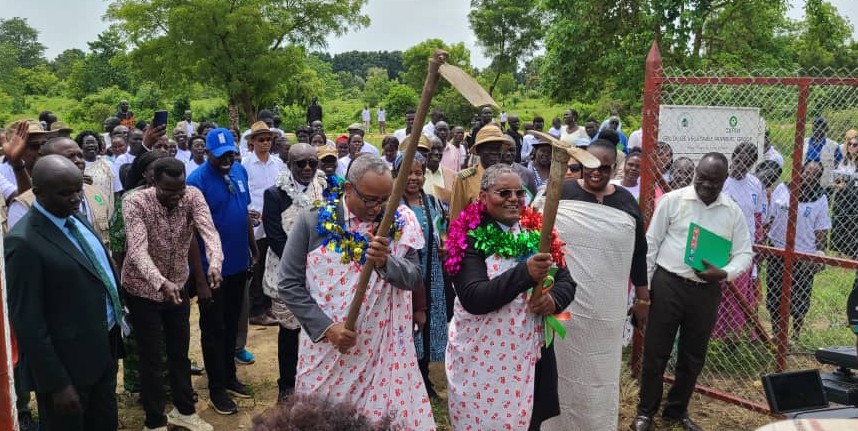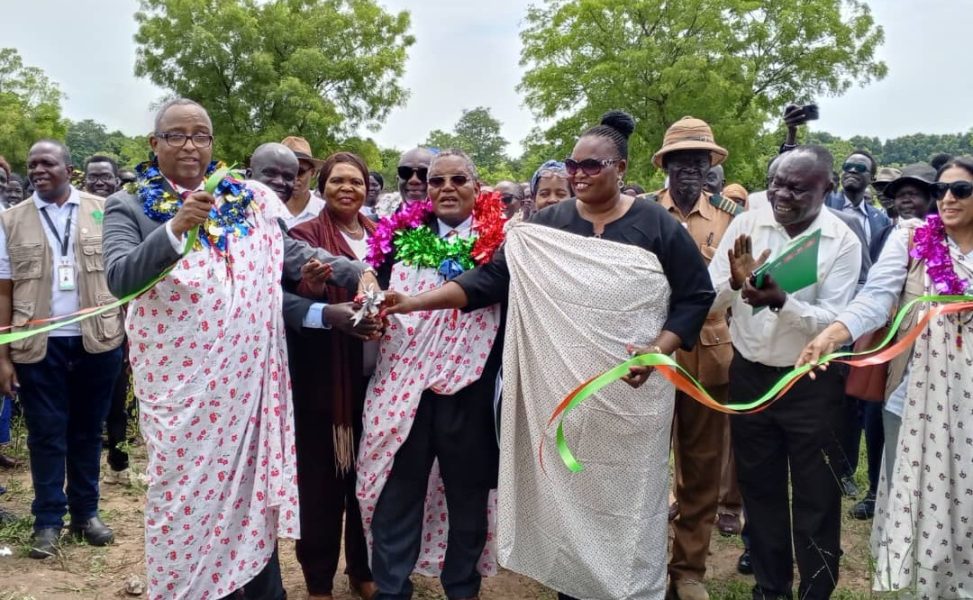
On the fertile banks of Rejaf East’s Gbuduge village, the sound of hoes striking the earth carries more than the promise of crops, it signals a new chapter for women and youth determined to fight hunger and reclaim their future through farming.
At the launch in Tokiman East, State Minister of Agriculture, Environment, and Forestry, Lilly Kapuki Paul, emphasized the importance of women and youth in driving the program forward.
“This project is not only about planting seeds in the soil, it is about planting hope in our homes,” she said.
Ms. Kapuki encouraged communities to embrace farming along riverbanks, especially during dry seasons, as a gateway to economic transformation.
State Minister of Gender, Child, and Social Welfare, Zendia Aluzaya, praised the initiative for centering women and youth in development.
“When women and youth thrive in agriculture, the whole community rises,” she said, urging farmers to invest energy in both staple and cash crops.
For UNDP Resident Representative, Dr. Mohamed Abchir, the launch marks a turning point.
“This is a fertile land. If we empower women and youth with the right tools and knowledge, hunger will become history in South Sudan,” he told the gathering.
The international partners echoed similar optimism.
South African Ambassador Adv. Mahlodi Muofhe highlighted that equipping young people with agricultural skills would strengthen both food security and economic growth.
Oxfam’s Country Director, Ms. Shabnam Baloch, reassured residents that the organization would work closely with local leaders to ensure the project delivers real impact in Rejaf and Luri Payams.
Community voices added a human face to the project. Kiden Mary, one of the young mothers, holding her child close, said the training had already given her confidence.
“Now we know how to prepare gardens and grow better crops. From this, I can feed my children, fight hunger, and even pay school fees.”
Yet challenges remain. Executive Chief of Tokiman Payam, Merino Pitia, warned that land grabbing and poor roads are limiting farmers’ potential.
“Without better roads, our farmers cannot reach markets, and our children cannot reach schools during the rainy season,” he said.
He urged the government to fast-track infrastructure projects, including the bridge linking Rejaf to Juba.
Gbuduge, Central Equatoria – Local communities have expressed optimism following the launch of a two-year IBSA-supported project, implemented by Oxfam in partnership with India, Brazil, and South Africa, aimed at empowering women and youth in Rejaf East.
Paska Juan, Women’s Representative in Gbuduge Village, said the initiative will transform livelihoods by improving farming, animal rearing, and water access. “It will supply water to our farms directly from the River Nile and change our lives. This is the first time we see support from our fellow African countries in this way,” she explained.
In Zirak, Women’s Representative Angelina Phillip Luri praised Oxfam and the government for supporting women’s initiatives.
The project seeks to enhance sustainable agriculture, community resilience, and self-reliance across Central Equatoria. Residents say it offers timely support, practical skills, and renewed hope for long-term development in their communities.
The launch ceremony closed with a groundbreaking event and the handover of four motorcycles to help coordinate project activities across the communities.
For many, it was more than a symbolic gesture, it was proof that support is reaching the ground.
Launched by the United Nations Development Programme (UNDP) and Oxfam, with support from the India, Brazil, and South Africa (IBSA) Fund, the two-year initiative aims to empower women and youth with modern farming skills.
About 1,200 women and youth are expected to benefit from this year’s project, gaining the tools and training needed to improve food security and build livelihoods.
As gardens are prepared and skills are put into practice, women and youth in Rejaf see more than crops ahead.
They see futures built on resilience, knowledge, and the soil beneath their feet.


